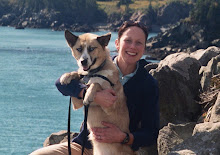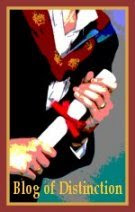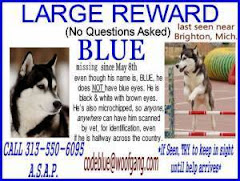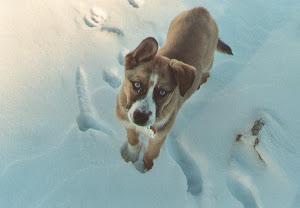
I've never really thought of myself as a dog person, so why on earth was I so certain my husband, Greg, and I needed to adopt one? We had lost our dog--my step-beagle, actually--a year earlier. Greg still hadn't recovered from the loss of his best friend. I still wasn't all that certain I even liked having a dog around. Even still, I found myself spending my free time visiting on-line animal adoption sites the same way most women my age look for shoe sales and information on breast feeding. When I spied a posting for a new litter of puppies at a local shelter, I decided (sight unseen) that somewhere in that litter was the perfect dog for us.
I was right--sort of. We drove over to the ramshackle shelter the next day, and there we met three wild looking pups, the result of a shelter love affair gone awry. Their father was a wolfish-looking husky; their mother, a Korean jindo. The blue-eyed, angular pups resulting from this seedy tryst were irresistible. And so, with little foresight, we adopted the most mischievous of the litter: a small female with a wide white blaze running down her nose and a clever grin.
We soon learned how wild this little dog really was. She was a leaky vessel with no sense of housebreaking during the day. At night, she howled with the strength of forty dogs. Worst of all, she was so terrified by her new living arrangements she would drop into a submissive role any time we even looked at her.
We soon learned how wild this little dog really was. She was a leaky vessel with no sense of housebreaking during the day. At night, she howled with the strength of forty dogs. Worst of all, she was so terrified by her new living arrangements she would drop into a submissive role any time we even looked at her.
I’m a college professor, though you wouldn’t have known it during that first week or so. I no longer had time to grade essays or prepare for class, not with the bathroom breaks every two hours and the constant policing of a puppy who had never before set foot in a house. I was grouchy and late for meetings. And when I returned home from an exhausting day, there were countless messes to clean. The puppy developed an early penchant for consuming paper and relished every opportunity to gnaw on books or shred important documents. I tried telling my students that the dog ate their homework, but they were not amused.
Still, we adored this dog: her soft puppy fur, the intensity of her blue eyes, the fact that (even as an infant) she knew the value of a good practical joke. And the feel of sweet puppy breath on your cheek? Heaven. We swore we would find a way to make this work. This little dog would become a real part of our family.
That meant she needed a name. And not just any moniker, but one that really fit. We considered the puppy’s heritage. We knew she was half Siberian Husky. Maybe we could name her after a dog-sledding term or the snowy terrain of the arctic. But other than her big, blue eyes, there was little that seemed reminiscent of her robust, Nordic ancestors. That left the jindo—a dog about which, in America at least, there is shockingly little known. A search on the World Wide Web revealed only basic information. The dog is medium sized with coyote-like ears and tail. They are fiercely loyal, amazingly athletic, and an official Korean National Monument. The last of these attributes intrigued us. This roly-poly, leaky vessel of a creature maintained important cultural status across the Pacific? Unbelievable.
We looked up from the computer screen and studied her closely—did she know her breed’s significance? She grinned goofily and snapped at our noses with her sharp puppy teeth, then tumbled onto her back. Doubtful, we concluded.
Nevertheless, Greg and I both loved this fact about the pup. We decided that, in the interest of international relations and the preservation of global culture, we owed it to this little dog to honor her monumental status. A student from Korea was in one of Greg’s writing courses, and he brought her several words and phrases to translate. It was still mid-February, so most of them dealt with the epic coldness of a Maine winter: words like snow, mitten, storm, and ice.
Could any of these be a Korean name for our half-Korean dog?
Hyun-Ju raised an eyebrow. “I don’t know if any of these will really work,” she warned. But she was polite enough to indulge us nevertheless.
Greg called home during lunch that day. I had returned for my second of four daily bathroom breaks, and the pup and I took the phone outside where I could talk and she could pee. Greg read off the Korean phrases, struggling with the phonetic spelling. As he did, I watched the puppy carefully—looking for a sign that we had stumbled upon the right name. Hyun-Ju was right: most of them were a stretch. But by the end of the conversation, we all agreed upon Bung Ari Jang Gab, which means mitten. Or more exactly, it means glove without fingers.
Over the next few days, we tried out several colloquial variations: Rijang, Fungari, Jangab. Our neighbor gave up and just began calling her Red Dog. My mother asked what was wrong with Spot or Rex. They both had a point—the dog’s full name was ungainly, and didn’t seem to have an obvious truncated form. Greg and I stumbled over our own tongues, trying to make it work. Then, early one sleepy morning as I rose to take the pup outside for yet another bathroom break, the name slipped out: Ari. Simple. Pronounceable. And somehow fitting, I thought.
Greg disagreed. “Ari means ‘without’,” he objected. “You can’t name a dog ‘without.’ That’s absurd.”
He had a point. It did seem silly. Without what?
But it was too late: by then, the name had already stuck, and even he was calling the puppy Ari.
Besides, in a way, that’s exactly what this shy little dog had been. Without her littermates. Without a name. Without a place.
Over the next few weeks, Ari gained all of those things. She had a new pack, albeit a human one; she learned her name, at least in its shortened form; she came to think of our house as her home, though she continued to pee in it.
In return, we gained quite a bit as well. Each morning, we were greeted as if we were the most interesting, delightful people she had ever met. Without fear. Each day, she forgave our foibles as we startled her in the kitchen or tripped over her in the dark. Without judgment. And, when the sun slowly brought the temperature up above zero, she compelled us to run and romp with total abandonment in the backyard as if we were ten-year-olds. Without restraint.
We were still sleep-deprived; I still wasn’t getting much work done; and the household casualties—more chewed books, more ruined rugs—continued to mount. But in spite of these problems, I was driven. I was even happy. I found myself beginning to look forward to those little breaks in the day when I could put on my winter boots and race around the yard. I discovered the joy of burying your face in puppy fur. I watched in wonder as she explored a single patch of ground for hours, curious to know what she was finding to catalog.
Clearly, I had a lot to learn from this puppy. Far more, I suspected, than she had to learn from me. And that’s when it occurred to me: why not let her be my teacher? Why not come to learn the world as she saw it? That’s exactly what I’ve set out to do. It hasn't always been easy, but it has been the most wonderful decision I've ever made.














